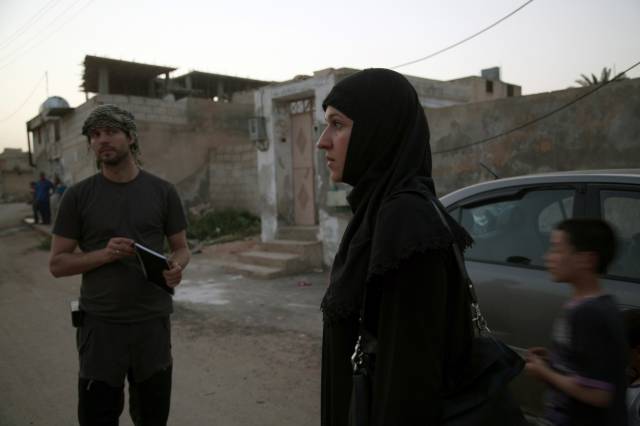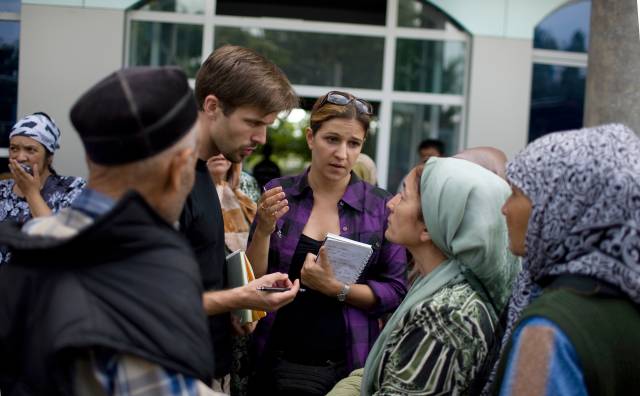

Flying all over the world to deal with unfolding human rights crises, Human Rights Watch’s E-TEAM (Emergency Team) are essentially real life superheroes, and now they’re also the center of a documentary film by Oscar-winner Ross Kauffman and Emmy-winner Katy Chevigny. Part thriller, part family drama and part character study, the plot unfolds seamlessly as the filmmakers focus on four E-TEAM members: Anna Neistat, a tough, eloquent Russian émigré, her husband and fellow investigator Ole Solvang of Norway, Peter Bouckaert, known as “the bang bang guy” and New York native Fred Abrahams, who at one point faced down Slobodan Milosevic.
We travel with the E-TEAM to Libya and Syria as they unmask corrupt political systems, and accompany them into their homes where we get to see them as their most relaxed. The film highlights the team members’ unique personalities, but never lets us forget of the exemplary work they’re doing all over the world. We had the pleasure of talking with Anna and Ole, who shared their thoughts about the dangers of their work, having a camera follow them around and the shows they binge on when they’re home.
My mother is a human rights activist and watching the film I couldn’t help but remember being a kid and worrying that she might not come back from work. How do you explain your line of work to your children?
Anna: First of all, when you watch the film it looks like a very dangerous job, but the reality is that it’s very manageable and we take risks very seriously. Every mission is preceded by lengthy security discussions and quite often we modify or cancel missions based on this. One of the things that makes me fairly comfortable is that we don’t just jump on the plane and go to these places. We’re not there to seek adventures and there are many more significantly dangerous jobs out there than what we do. It’s also difficult to travel and be away from the kids, but it’s very healthy for them to grow up with parents who do something meaningful. Growing up watching your parents dedicated to their work and enjoying it, being passionate about what they do is the best way to allow your children choose the path they want to take in life.
Ole: I think most of the time poor drivers or poor roads are more dangerous than being in an airstrike, for example, or any of the other “spectacular risks”.
Was it weird to have the cameras following you around while you were trying to do your job?
Ole: For me it was definitely one of the concerns we had with our organization, because we didn’t want the camera to affect our work or impact the relationships we had with the people we meet. But the camera crew were very discreet, they would never interrupt or ask us to do anything. After a while we were forgetting they were there and the victims were also very comfortable. Part of why they speak to us is because they want their stories to be heard and having a camera was not a problem for them.
Anna: I think we did our best to facilitate what they needed and the moment we realized the element of trust worked, then we were all happy. On a technical level we didn’t have a huge crew around us or anything. All of the camera people, including James Foley, were so discreet, both as people but also in terms of the equipment.
We don’t really get to see much about what happens in Human Rights Watch, so do you think people will be surprised at what your work entails?
Anna: That was part of why we agreed to make this film, it was the best way to show people what our work is about. It’s not some Rambo-type thing where we jump into situations and save the world, but it’s also not a boring desk job. It’s a meticulous job of collecting information and evidence in the field and trying to figure out a strategy to present it to the world and also use it to change things, what we call advocacy. The film covers all the key aspects of what we do in an approachable way.
Ole: People who’ve seen the movie also comment on the humorous moments, it’s not about horror and tragedy. While we take all the issues very seriously, we also have to have relationships.
Were you surprised with the structure of the film when you saw it for the first time?
Anna: I was not just surprised, I was blown away when I realized they put this together as a narrative. I kept asking Ross, how we would put it all together. It was a total mystery to me and I think they did a very good job, both capturing the family moments and also showing what’s happening in Syria and Libya. It’s a credit to the editors really.
I know you weren’t putting on a performance, but watching your scenes, Anna, reminded me of watching The Good Wife in which we see Julianna Margulies take on family and social issues…
Anna: (laughs) I’ve seen that show.
I’m just curious in particular with your arc, because you get some amazing onscreen moments, if you were nervous at any point or trying to be composed.
Anna: At the beginning I was very nervous, not so much about what I said but about how my hair looked. I mean come on, if you’re a woman and you’re going to be on the big screen, I could totally see in the film the moments that were shot in the beginning and the moments filmed towards the end where I was just relaxed. I can see some moments where I sound very artificial in the way I talk or walk. I think we reacted to the cameras in the same way we react to stressful events, I start talking too much and Ole shuts down completely, which I think represents our personalities really well. But you forget all about that when you’re in the field…
Ole: It was harder at home though.
Anna: There is a hilarious deleted scene when they wanted to film a family dinner at our house, which we honestly never have. We always promise ourselves that we’ll start having those but we’re in a rush and we always eat around the kitchen counter, but at this point we decided to set up this formal family dinner and it was hilarious, it was so artificial (laughs). We all sat down and poured wine and served food and asked each other about our days at work and in school.
How do you unwind when you’re not at work? Do you ever have time to watch anything on Netflix?
Anna: We used to more when we lived in New York, but in Paris, it’s just getting started.
Ole: And we definitely signed up!
Anna: Ole likes to watch a lot of stupid stuff because of the boys, but I like French movies that are sophisticated and where nothing happens, which make Ole fall asleep.
Ole: But something we have in common are the TV series! We watched E.R.
Anna: Fifteen seasons beginning to end!
So you do like Julianna Margulies!
Ole: I really like The West Wing too. But we end up working a lot and because we both do the same and when we both have the chance to relax we put something on TV and have a glass of wine and hang on the couch together.
Anna: We’re also very active viewers, we discuss quite a bit what’s happening.
Ole: You discuss it, I’m just listening.
Anna: (laughs)
 What are some of these French films you’ve been watching?
What are some of these French films you’ve been watching?
Anna: I almost divorced Ole when he fell asleep during the first fifteen minutes of A Man and a Woman.
Ole: I had just come back from a mission, I was completely jet-lagged and she puts on this movie where nothing happens.
Anna: There’s this scene where they’re walking down the beach for like fifteen minutes and nothing’s going on, but that’s really the beauty of it.
Can you comment how excited you are about the film being on Netflix?
Anna: Films sit on Netflix for quite a while and it gives our film the chance to not only cover a big audience but also stay alive for a long time, which is good because these issues will be relevant for a very long time.
Have you seen anything recently that was related to your work, which you thought was accurate in depicting social and political issues?
Anna: We saw this movie we all agreed was good. It was a thriller, but one of the better ones.
A Most Wanted Man?
Anna: Yeah! We liked that one. We also try to watch movies that won’t hit too close to home.
Ole: It’s difficult to watch movies about situations we know very well, like a movie they made about the Georgia war which wasn’t very good, but it was difficult for us to sit there and not criticize it. I prefer movies that won’t make me think too hard, I like to be entertained.
Have you been approached by studios who want to make fiction films about you?
Ole: There’s been a few non-committal things, but we don’t know if that’s anything we’ll be involved in necessarily.
Have you discussed who would you want to play you?
Anna: There is a running wager at the office about who’s playing whom, but we haven’t really settled on anything.
Ole: I have no opinion about that.
Anna: People have a lot of opinions about who should play you, but it hasn’t been settled. We’re also supposed to be writing a book. An autobiographical thriller might be in the works (laughs)
E-TEAM is now in select theaters and on Netflix.